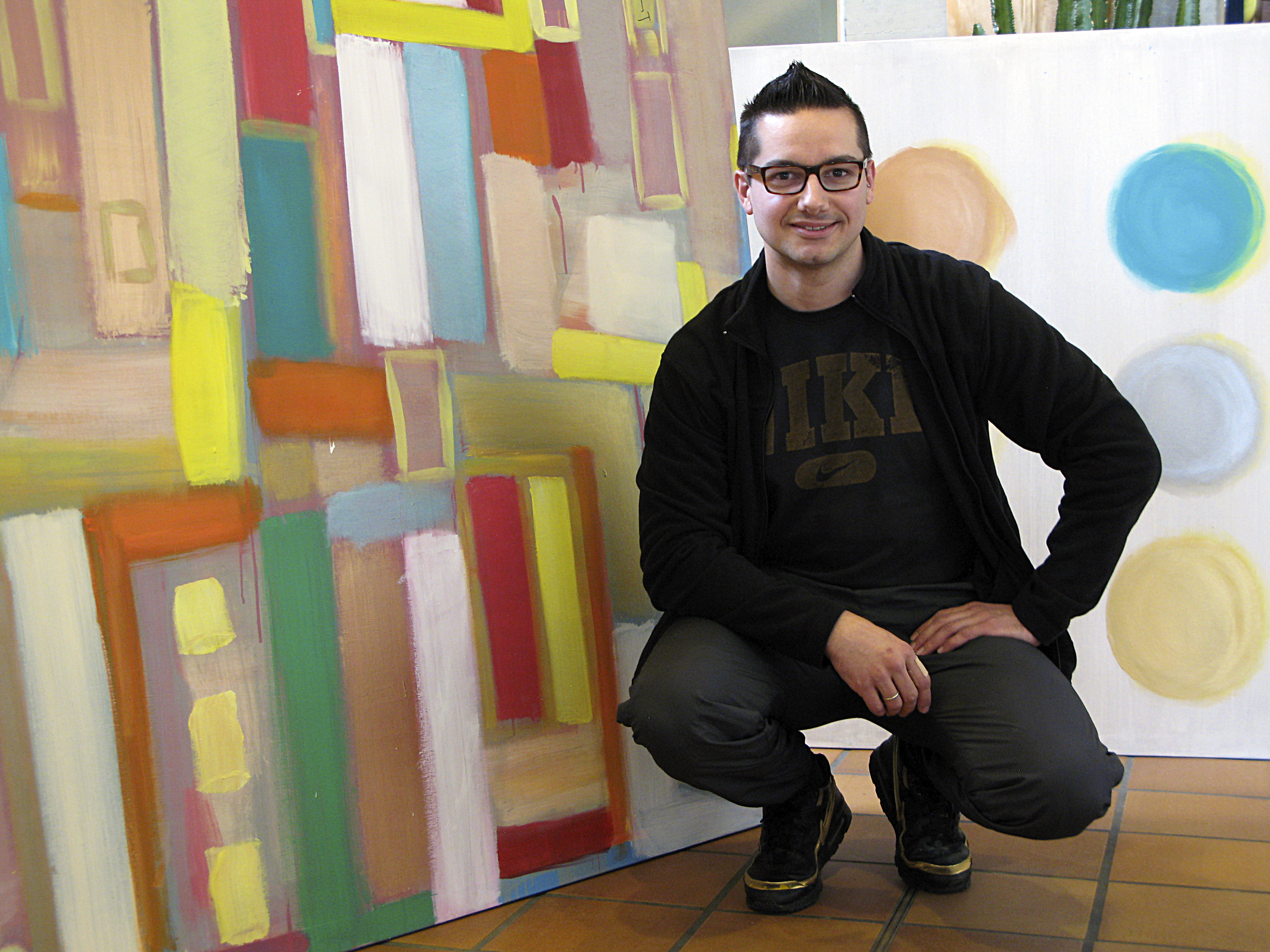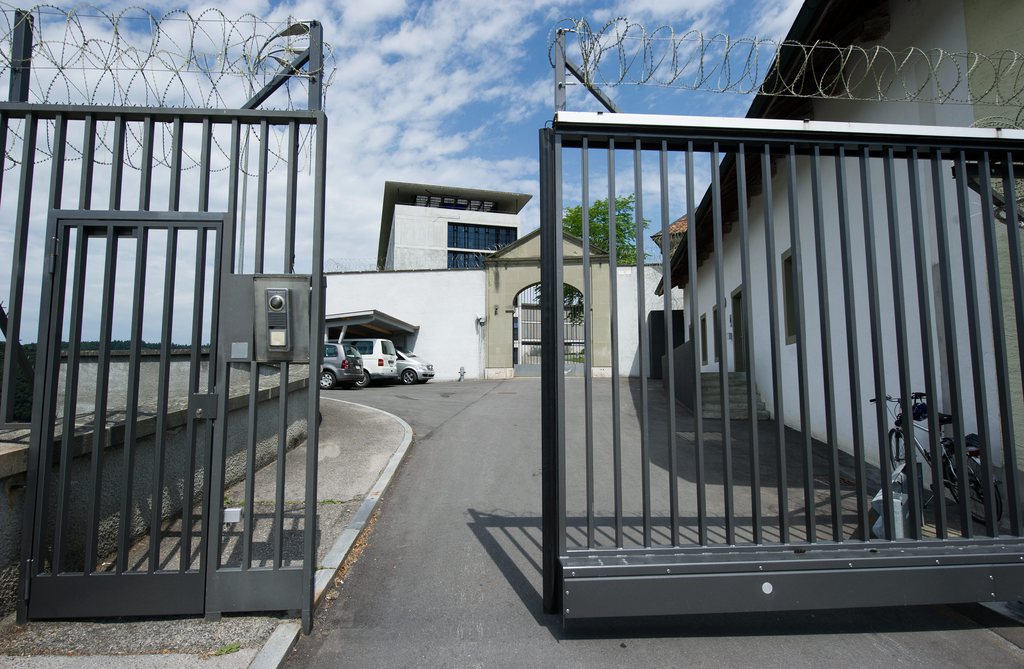Prison helps inmates prepare for the workforce

For the inmates at Wauwilermoos Prison in central Switzerland, work helps pass the time as they wait out their sentence. While work is mandatory for all prisoners, some see it as a chance for self-improvement.
The coral-coloured building deep in the Lucerne countryside doesn’t look much different from a typical local school or apartment block. Only the gate and the delicate barbed wire hint at the fact that it’s a prison.
Wauwilermoos is a so-called “open prison” – meaning that during the day the inmates are allowed to move freely about the property’s 150 hectares, which are not surrounded by a wall.
This cantonal correctional facility is the temporary home and workplace of 61 men aged 19 to 70, serving anywhere from two months to four years.
“We have 20 types of jobs available. Many of the inmates work well, or even very well, while there are others who have some difficulty,” says Hans Troxler, deputy director. Whether it’s a job in the kitchen, in construction or on the organic farm, the men have to report for duty at 7:30am – and there are no wake-up calls.
“We’re trying to keep it realistic by putting the responsibility on the men,” Troxler explains. Working is a tool to help them to re-socialise while maintaining or improving their skills. About 50 per cent of the inmates were unemployed prior to arrival. A third had never been in prison before.
Of the 61 inmates, one escaped in 2012. Yet that same year, 1,200 periods of leave were granted; on only three occasions did the prisoner fail to return on time.
“We have very few who want to flee,” Troxler says, comparing his facility with high-security ones that house what he calls “criminal tourists” who have no life in Switzerland and are eager to hit the road again.
According to the Swiss penal code, labour is a key element of incarceration and prisoners are required to work. The tasks assigned should be a reasonable match for the inmate’s abilities and education. Swiss prisons typically have on-site workshops in which it is possible to receive vocational training. Some of the more basic chores like laundry help to keep the prison running.
Inmates are paid for their work, albeit less than the market rate.
Of this income, just a portion is made available during incarceration; the balance is set aside for after release.
By law, prisoners should have the chance to pursue an apprenticeship or further their education, but few inmates take advantage of this.
Keeping busy
When swissinfo.ch visited Wauwilermoos, the atmosphere was pleasant and relaxed. The inmates were busy with a variety of tasks both indoors and out, some of them working quite independently.
Joseph, 42 and serving time for involvement with drugs, used to work in construction; now he seems to enjoy his job preparing the prison’s produce for sale at Swiss retailers like Coop and Migros. He cheerfully rattles off what’s currently in season.
“It’s more interesting in summer, when there’s a greater variety,” he remarks while weighing a tray of freshly-harvested winter lettuce. However, it’s also more hectic then.
The public can shop at the prison’s organic grocery store, which carries everything from vegetables to dairy products to meat. Two men run the shop: a regular employee and an inmate, who attends evening business courses in Aarau once a week.
Alois Dubach, the nursery’s supervisor, has been working at the prison for 30 years and finds it rewarding. He acknowledges that the inmates are different from regular employees.
“It’s a pleasure to see someone who’s never worked before become employable after his time here,” Dubach says.
Swiss: 54 per cent (including some naturalised)
Serbian: 11 per cent
Macedonian: seven per cent
Turkish: five per cent
Algerian: three per cent
Italian: three per cent
Sri Lankan: three per cent
Followed by inmates from Angola, Bosnia Herzegovina, Congo, Croatia, Ivory Coast, Kosovo, Libya, Spain, Thailand
Source: Wauwilermoos Prison (2011)
Additional training
School is also a part of the rehab programme. Divided into groups of 4-6, the inmates can attend class for a half day per week. There they learn basic subjects like German, mathematics and computer skills.
“Many of them didn’t go to school here in Switzerland. The younger ones are especially motivated; they know that they missed something,” says instructor Adolf Amrein. There are no tests or marks, but there is homework – which may or may not get done, the former secondary school teacher notes wryly.
Still, the students receive a letter of participation to show potential employers. In it there is no mention of the fact that they attended while in prison.
Currently, three of the inmates are pursuing apprenticeships. One travels to Lucerne one day a week to go to vocational training school. Only the teacher and the principal know that he’s a prisoner; to the others he’s just a regular student.
Another recently had the opportunity to do a week-long training course for welders, at which he earned a professional federal diploma.
“It’s not so much difficult or dangerous, but it does take practice,” says 25-year-old Antonio of his new skills. He was sentenced to 21 months for robbery and assault, but if things work out, he can spend the last seven months in a supervised home for men while working at a regular job. After that he looks forward to joining his wife, whom he married on the prison grounds.
Originally from Serbia, Ivan found himself in trouble for prior involvement in a drug ring. By the time the law caught up with him, he was married to a Swiss woman with whom he was running a telemarketing firm. Today the 32-year-old is training to become a chef’s assistant.
“Now and then my motivation lags, but it’s my only chance to learn something now,” Ivan says, admitting that it’s not his dream job. However, he says he is very grateful for the chance.
“We all have a lot of opportunities if we want to do something here,” says Ivan, who will be able to re-join his wife and young daughter in August 2014. He enjoys the painting classes in particular; it’s also possible to take driving or English lessons.
20 per cent – sex crimes, indecent behaviour
18 per cent – narcotics
18 per cent – fraud, corruption
13 per cent – robbery
13 per cent – homicide
11 per cent – bodily harm
Five per cent – immigration issues
Two per cent – traffic violations
Source: Wauwilermoos Prison (2011)
Moving on up
According to Troxler, the men must be motivated if they want to benefit: “We’re there to help and support them, but there has to be a significant personal contribution. It’s really a give and take.”
Education and training are financed partly by the inmates, partly by their families and partly through charitable foundations.
While the schooling is optional, inmates are required to attend training sessions to learn how to keep out of trouble by identifying high-risk situations and dealing with critical situations properly.
There are no statistics regarding recidivism among the prison’s inmates, but it is possible to observe their attitudes and employment status upon release. They fill in a questionnaire rating their experience at Wauwilermoos, and the feedback is usually quite good, according to Troxler.
And although it isn’t always easy, prison staff help the inmates find work after release.
“We find a job for practically everyone,” Troxler says.

In compliance with the JTI standards
More: SWI swissinfo.ch certified by the Journalism Trust Initiative



You can find an overview of ongoing debates with our journalists here. Please join us!
If you want to start a conversation about a topic raised in this article or want to report factual errors, email us at english@swissinfo.ch.